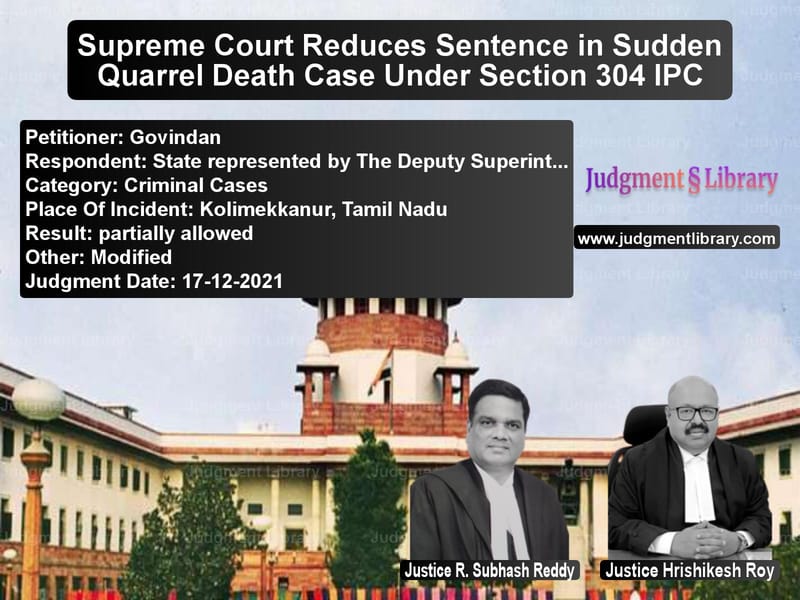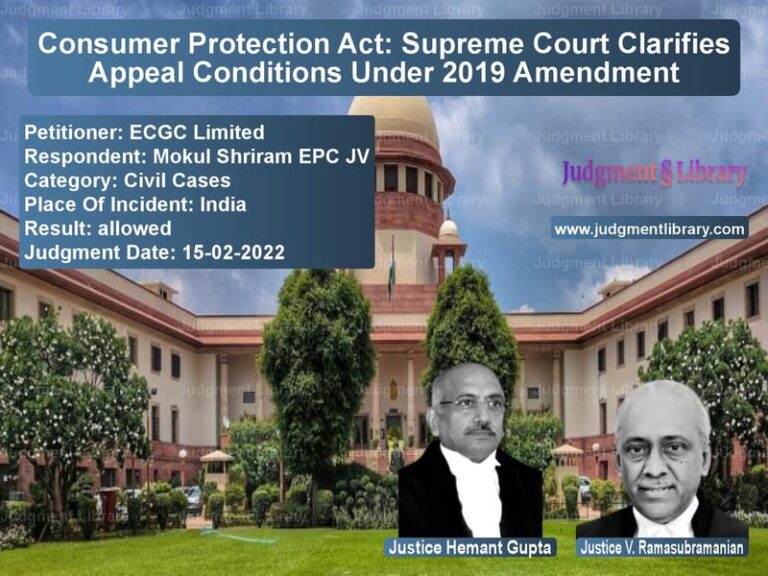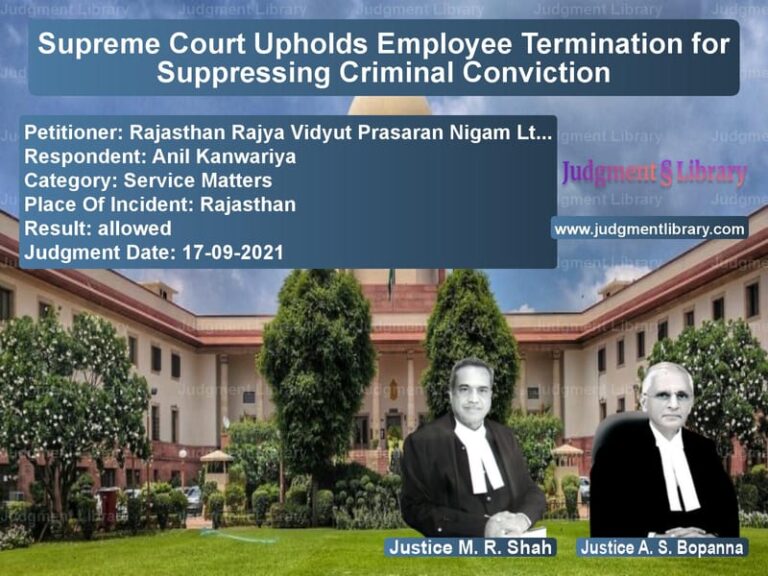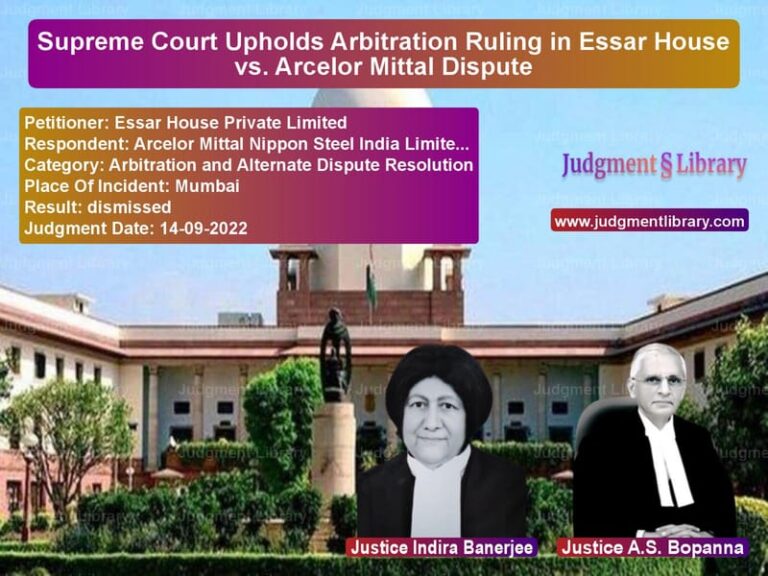Supreme Court Reduces Sentence in Sudden Quarrel Death Case Under Section 304 IPC
The Supreme Court of India recently delivered a significant judgment in Govindan vs. State, modifying the sentence in a case where the appellant was convicted for culpable homicide not amounting to murder under Section 304(ii) of the Indian Penal Code (IPC). The case revolved around a land dispute that escalated into a violent altercation, leading to the death of the complainant’s family member. The Supreme Court, while upholding the conviction, reduced the sentence from ten years to two years, considering the circumstances of the incident.
Background of the Case
The appellant, Govindan, and the complainant’s family were involved in a longstanding land dispute regarding the use of a cart track leading to agricultural land. The conflict reached a critical point on June 14, 2010, when an altercation took place between the two families in front of the appellant’s house. The dispute over the pathway escalated, resulting in Govindan fatally attacking Kamsala, a member of the complainant’s family.
Following the incident, the prosecution charged Govindan and three others under Sections 302 read with 34, 307 of the IPC and Section 3(2)(v) of the Scheduled Castes and Scheduled Tribes (Prevention of Atrocities) Act, 1989. However, while the Trial Court acquitted the other accused, it convicted Govindan under Section 304(ii) IPC and sentenced him to ten years of rigorous imprisonment along with a fine of Rs. 5,000.
Read also: https://judgmentlibrary.com/death-penalty-commuted-to-life-imprisonment-in-child-murder-case/
Appeal Before the High Court
Govindan challenged the conviction before the Madras High Court. However, the High Court, in its judgment dated August 16, 2019, upheld the Trial Court’s findings and affirmed the ten-year sentence.
Arguments Before the Supreme Court
Appellant’s (Govindan) Arguments:
- The altercation was sudden and unplanned, arising out of a land dispute.
- The complainant’s family members were the aggressors, and the incident occurred in the heat of the moment.
- The Trial Court had acknowledged that Govindan acted in self-defense but exceeded the permissible limit.
- Other family members of the accused had also suffered injuries during the quarrel, indicating mutual aggression.
- The sentence of ten years was excessive given the circumstances.
Respondent’s (State) Arguments:
- The attack resulted in a fatal injury, which justified a severe sentence.
- Govindan should have sought legal recourse regarding the land dispute instead of resorting to violence.
- Given the gravity of the offense, no leniency in sentencing was warranted.
Supreme Court’s Observations
The Supreme Court analyzed the evidence and the Trial Court’s findings, noting the following:
- The quarrel was spontaneous, with no premeditation.
- The complainant’s family members had violated a Civil Court injunction that favored the accused.
- Govindan’s actions were a reaction to provocation rather than a pre-planned attack.
- Given the nature of the offense, the case fell under Section 304(ii) IPC instead of Section 302 IPC.
Final Judgment
The Supreme Court upheld the conviction but modified the sentence as follows:
- The sentence was reduced from ten years to two years of rigorous imprisonment.
- The fine of Rs. 5,000 was retained, with a default sentence of three months rigorous imprisonment.
- The Court emphasized that the punishment should reflect the sudden nature of the crime and the absence of premeditation.
Key Takeaways
- Spontaneous Quarrels Can Mitigate Sentencing: The judgment reaffirms that if an offense occurs in the heat of the moment, sentencing can be reduced.
- Self-Defense and Private Defense Considerations: Even when a person acts in self-defense, exceeding the legal limit may still result in punishment, but with due leniency.
- Role of Civil Disputes in Criminal Cases: The judgment highlights how civil disputes can escalate into criminal matters, necessitating legal intervention at an early stage.
- Supreme Court’s Role in Sentencing Review: The Court can revise sentences if it finds that the punishment is disproportionate to the circumstances of the offense.
This ruling serves as an important precedent in criminal law, reinforcing the principle that sentencing must be proportional to the facts of the case.
Petitioner Name: Govindan.Respondent Name: State represented by The Deputy Superintendent of Police.Judgment By: Justice R. Subhash Reddy, Justice Hrishikesh Roy.Place Of Incident: Kolimekkanur, Tamil Nadu.Judgment Date: 17-12-2021.
Don’t miss out on the full details! Download the complete judgment in PDF format below and gain valuable insights instantly!
Download Judgment: govindan-vs-state-represented-by-supreme-court-of-india-judgment-dated-17-12-2021.pdf
Directly Download Judgment: Directly download this Judgment
See all petitions in Murder Cases
See all petitions in Attempt to Murder Cases
See all petitions in SC/ST Act Case
See all petitions in Judgment by R. Subhash Reddy
See all petitions in Judgment by Hrishikesh Roy
See all petitions in partially allowed
See all petitions in Modified
See all petitions in supreme court of India judgments December 2021
See all petitions in 2021 judgments
See all posts in Criminal Cases Category
See all allowed petitions in Criminal Cases Category
See all Dismissed petitions in Criminal Cases Category
See all partially allowed petitions in Criminal Cases Category







